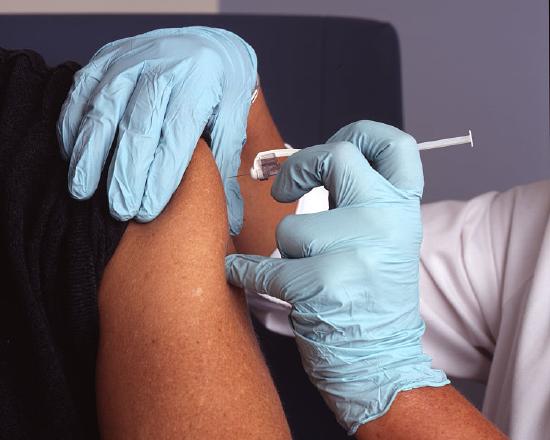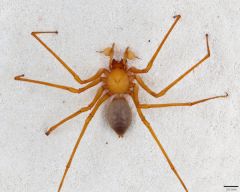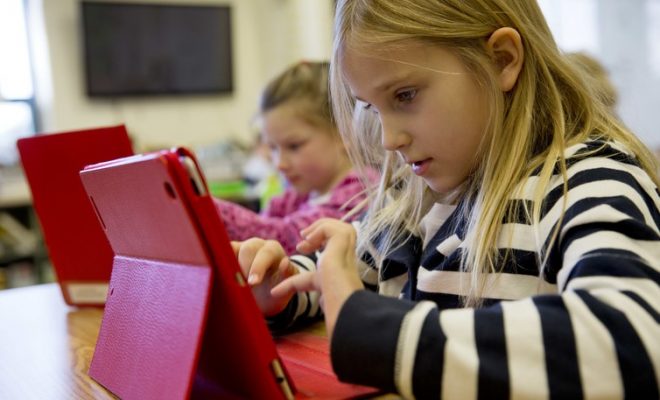
- school Campus Bookshelves
- menu_book Bookshelves
- perm_media Learning Objects
- login Login
- how_to_reg Request Instructor Account
- hub Instructor Commons
- Download Page (PDF)
- Download Full Book (PDF)
- Periodic Table
- Physics Constants
- Scientific Calculator
- Reference & Cite
- Tools expand_more
- Readability
selected template will load here
This action is not available.


1.2: What Is Science?
- Last updated
- Save as PDF
- Page ID 16712

- Suzanne Wakim & Mandeep Grewal
- Butte College
This individual in Figure \(\PageIndex{1}\) is getting a flu vaccine. You probably know that getting a vaccine can hurt, but it's usually worth it. A vaccine contains dead or altered forms of "germs" that normally cause a disease, such as flu or measles. The germs in vaccines have been inactivated or weakened so they can no longer cause illness, but they are still "noticed" by the immune system. They stimulate the immune system to produce chemicals that can kill the actual germs if they enter the body, thus preventing future disease. How was such an ingenious way to prevent disease discovered? The short answer is more than two centuries of science.

Science as Process
You may think of science as a large and detailed body of knowledge, but science is actually more of a process than a set of facts. The real focus of science is the accumulation and revision of scientific knowledge. Science is a special way of gaining knowledge that relies on evidence and logic. Evidence is used to continuously test ideas. Through time, with repeated evidence gathering and testing, scientific knowledge advances.
We've been accumulating knowledge of vaccines for more than two centuries. The discovery of the first vaccine, as well as the process of vaccination, dates back to 1796. An English doctor named Edward Jenner observed that people who became infected with cowpox did not get sick from smallpox, a similar but much more virulent disease (Figure \(\PageIndex{2}\)). Jenner decided to transmit cowpox to a young child to see if it would protect them from smallpox. He gave the child cowpox by scratching liquid from cowpox sores into the child's skin. Then, six weeks later, he scratched liquid from smallpox sores into the child's skin. As Jenner predicted, the child did not get sick from smallpox. Jenner had discovered the first vaccine, although additional testing was needed to show that it really was effective.

Almost a century passed before the next vaccine was discovered, a vaccine for cholera in 1879. Around the same time, French chemist Louis Pasteur found convincing evidence that many human diseases are caused by germs. This earned Pasteur the title of "father of germ theory." Since Pasteur's time, vaccines have been discovered for scores of additional diseases caused by "germs," and scientists are currently researching vaccines for many others.
Benefits of Science
Medical advances such as the discovery of vaccines are one of the most important benefits of science, but science and scientific knowledge are also crucial for most other human endeavors. Science is needed to design safe cars, predict storms, control global warming, develop new technologies of many kinds, help couples have children, and put humans on the moon! Clearly, the diversity of applications of scientific knowledge is vast!
- Explain why science is more accurately considered a process than a body of knowledge.
- State three specific examples of human endeavors that are based on scientific knowledge.
- Jenner used a young boy as a research subject in his smallpox vaccine research. Today, scientists must follow strict guidelines when using human subjects in their research. What unique concerns do you think might arise when human beings are used as research subjects?
- What gave Jenner the idea to develop a vaccine for smallpox?
- Why do you think almost a century passed between the development of the first vaccine (for smallpox) and the development of the next vaccine (for cholera)?
- How does science influence your daily life?
Explore More
bio.libretexts.org/link?16712#Explore_More
Check out this video to learn more about the smallpox vaccine:
Attributions
- Nurse administers a vaccine by Rhoda Baer for National Cancer Institute, public domain via Wikimedia Commons
- Child with smallpox by CDC/James Hicks, public domain via Wikimedia Commons
- Text adapted from Human Biology by CK-12 licensed CC BY-NC 3.0
- Skip to primary navigation
- Skip to main content
- Skip to footer
Understanding Science
How science REALLY works...
Teaching Resources
How science works.
Grade Level(s):
- California Academy of Sciences
Resource type:
- Science Story
Discipline:
- Life Science
Time: 10 minutes
This Science in Action video uses the Understanding Science Flowchart to follow arachnologist Charles Griswold and colleagues as they describe the process involved in an exciting new spider discovery.
Go to this resource »

- Teaching tips
- Teaching background
- [What is science?: Grades 6-8] Science is both a body of knowledge and the process for building that knowledge. (NOS5)
- [What is science?: Grades 6-8] Science aims to build explanations of the natural world. (P3, P6)
- [What is science?: Grades 6-8] Scientists strive to test their ideas with evidence from the natural world; a hallmark of science is exposing ideas to testing. (P3, P4, P6, P7, NOS2)
- [What is science?: Grades 6-8] Scientific knowledge is open to question and revision as new ideas surface and new evidence is discovered. (P6, NOS3)
- [What is science?: Grades 6-8] Science is ongoing; answering one scientific question frequently leads to additional questions to be investigated. (P1)
- [What is science?: Grades 9-12] Science is both a body of knowledge and the process for building that knowledge. (NOS5)
- [What is science?: Grades 9-12] Science aims to build explanations of the natural world. (P3, P6)
- [What is science?: Grades 9-12] Scientists strive to test their ideas with evidence from the natural world; a hallmark of science is exposing ideas to testing. (P3, P4, P6, P7, NOS2)
- [What is science?: Grades 9-12] Scientific knowledge is open to question and revision as new ideas surface and new evidence is discovered. (P4, P6, NOS3)
- [What is science?: Grades 9-12] Science is ongoing; answering one scientific question frequently leads to additional questions to be investigated. (P1)
- [What is science?: Grades 13-16] Science is both a body of knowledge and the process for building that knowledge.
- [What is science?: Grades 13-16] Science focuses on natural phenomena and processes.
- [What is science?: Grades 13-16] Scientists strive to test their ideas with evidence from the natural world; a hallmark of science is exposing ideas to testing.
- [What is science?: Grades 13-16] Scientific knowledge is open to question and revision as new ideas surface and new evidence is discovered.
- [What is science?: Grades 13-16] Science is ongoing; answering one scientific question frequently leads to additional questions to be investigated.
- [How science works: Grades 13-16] The real process of science is complex, iterative, and can take many different paths.
- [How science works: Grades 6-8] The process of science involves observation, exploration, testing, communication, and application.
- [How science works: Grades 6-8] The real process of science is complex, iterative, and can take many different paths.
- [How science works: Grades 6-8] Scientists test their ideas by predicting what they would expect to observe if their idea were true and then seeing if that prediction is correct. (P4, P6)
- [How science works: Grades 6-8] Scientists look for patterns in their observations and data. (P4, P5)
- [How science works: Grades 9-12] The real process of science is complex, iterative, and can take many different paths.
- [How science works: Grades 9-12] The process of science involves observation, exploration, testing, communication, and application.
- [How science works: Grades 9-12] Scientists test their ideas (hypotheses and theories) by figuring out what expectations are generated by an idea and making observations to find out whether those expectations are borne out. (P4, P6)
- [How science works: Grades 9-12] Scientists look for patterns in their observations and data. (P4, P5, NOS2)
- [How science works: Grades 9-12] Researchers share their findings with the scientific community through scientific publications. (P8)
- [How science works: Grades 13-16] The process of science involves observation, exploration, testing, communication, and application.
- [How science works: Grades 13-16] Scientists test their ideas (hypotheses and theories) by figuring out what expectations are generated by an idea and making observations to find out whether those expectations are borne out.
- [How science works: Grades 13-16] Scientists look for patterns in their observations and data.
- [How science works: Grades 13-16] Researchers share their findings with the scientific community through scientific publications.
- [Hypotheses and theories: Grades 6-8] Hypotheses are potential explanations for what we observe in the natural world. (P6)
- [Hypotheses and theories: Grades 6-8] Hypotheses are usually inspired and informed by previous research and/or observations. They are not guesses. (P6)
- [Hypotheses and theories: Grades 9-12] Hypotheses are proposed explanations for a narrow set of phenomena. (P6)
- [Hypotheses and theories: Grades 9-12] Hypotheses are usually inspired and informed by previous research and/or observations. They are not guesses. (P6)
- [Hypotheses and theories: Grades 13-16] Hypotheses are proposed explanations for a narrow set of phenomena.
- [Hypotheses and theories: Grades 13-16] Hypotheses are usually inspired and informed by previous research and/or observations. They are not guesses.
- [The social side of science: Grades 6-8] Science depends on communication within the scientific community. (P7, P8)
- [The social side of science: Grades 6-8] Scientists usually work collaboratively. (NOS7)
- [The social side of science: Grades 6-8] Scientists check each other's work, often through peer review. (P7)
- [The social side of science: Grades 6-8] Anyone can participate in science.
- [The social side of science: Grades 9-12] Science depends on communication within the scientific community. (P7, P8)
- [The social side of science: Grades 9-12] Scientists usually work collaboratively. (NOS7)
- [The social side of science: Grades 9-12] Scientists scrutinize each other's work through peer review and other processes. (P7, NOS5)
- [The social side of science: Grades 9-12] Science relies on the accumulated knowledge of the scientific community to move forward. (NOS5)
- [The social side of science: Grades 9-12] Anyone can participate in science, but the pursuit of science as a career often requires extensive formal training.
- [The social side of science: Grades 13-16] Science depends on communication within the scientific community.
- [The social side of science: Grades 13-16] Scientists usually work collaboratively.
- [The social side of science: Grades 13-16] Scientists scrutinize each other's work through peer review and other processes.
- [The social side of science: Grades 13-16] Science relies on the accumulated knowledge of the scientific community to move forward.
- [The social side of science: Grades 13-16] Anyone can participate in science, but the pursuit of science as a career often requires extensive formal training.
- [What has science done for you lately: Grades 6-8] Scientific knowledge helps us make decisions that affect our lives every day.
- [What has science done for you lately: Grades 9-12] Scientific knowledge helps us make decisions that affect our lives every day.
- [What has science done for you lately: Grades 13-16] Scientific knowledge helps us make decisions that affect our lives every day.
- NOS Matrix understanding category 1. Scientific investigations use a variety of methods.
- NOS Matrix understanding category 2. Scientific knowledge is based on empirical evidence.
- NOS Matrix understanding category 3. Scientific knowledge is open to revision in light of new evidence.
- NOS Matrix understanding category 5. Science is a way of knowing.
- Science and Engineering Practice 3. Planning and carrying out investigations
- Science and Engineering Practice 4. Analyzing and interpreting data
- Science and Engineering Practice 5. Using mathematics and computational thinking
- Science and Engineering Practice 6. Constructing explanations and designing solutions
- Science and Engineering Practice 7. Engaging in argument from evidence
- Science and Engineering Practice 8. Obtaining, evaluating, and communicating information
- Exploration and discovery
- Peer review
- Process of science
- Scientific arguments/evidence/testing ideas
- What is science/nature of science
Subscribe to our newsletter
- Understanding Science 101
- The science flowchart
- Science stories
- Grade-level teaching guides
- Teaching resource database
- Journaling tool
- Misconceptions
If you're seeing this message, it means we're having trouble loading external resources on our website.
If you're behind a web filter, please make sure that the domains *.kastatic.org and *.kasandbox.org are unblocked.
To log in and use all the features of Khan Academy, please enable JavaScript in your browser.
High school physics
Looking for high school physics material, unit 1: one-dimensional motion, unit 2: forces and newton's laws of motion, unit 3: two-dimensional motion, unit 4: uniform circular motion and gravitation, unit 5: work and energy, unit 6: linear momentum and collisions, unit 7: torque and angular momentum, unit 8: simple harmonic motion, unit 9: waves, unit 10: sound, unit 11: static electricity, unit 12: dc circuits.
- International edition
- Australia edition
- Europe edition

The science of homework: tips to engage students' brains
Neurologist Judy Willis explores what kinds of homework help students at different stages of development and just how long out-of-hours work should take
If you know a bit about the brain then you can plan homework to suit the needs of students as they develop.
During early school years, for example, the brain is focused on getting to grips with the world around us. Memories and understanding grow when new information can be linked to things we already know. Homework that helps with this recognition can build literacy and numeracy skills.
When students reach adolescence, they become more independent and self-directed. There is shift away from rote memorisation and single, correct responses. Learning goals are more likely to focus on reading for content and comprehension, revising, report writing, solving problems, investigating and independent or group work.
Well designed homework provides multiple ways for students to engage with what they are learning. They will then be able to use the facts they acquire to be creative and solve problems in class.
When to use online learning games for homework
Most teachers work hard to differentiate homework based on skill level, but with each new topic there may not be time to prepare individual tasks. Online games, in which pupils learn and test their factual knowledge, can be helpful when homework goals are about building a foundation of knowledge. This tends to be in the early years of school.
Computer-assisted learning cannot replace good teaching: it is only from teachers that students can experience rich interactive learning and build conceptual understanding.
But using online learning games for homework tasks lets students gain the necessary level of factual knowledge and learn procedures that need to be memorised. This allows them to then progress in class to the richer subject content. Relieving teachers of essentially being drill directors means students get more class time to understand concepts and apply what they have learned.
Online games also help students to build skills to an automatic level at an appropriate pace for them. For example, games could be helpful in learning multiplication tables, spelling, remembering dates, names of rivers, foreign language learning, or getting to grips with grammar rules. Well designed online skill games evaluate each student’s ability as the basis for the questions or problems given.
A good website for information about hundreds of availableprograms is graphite . You can browse by subject, grade level and skills, and see rankings of popularity with learners and teacher evaluations.
The importance of homework that students value
In later school years homework is more likely to focus on reading for understanding, revising and launching investigations.
When students know that the effort they put into homework will enhance their participation and enjoyment of classroom learning, they become more motivated. Pupils also put more effort into schoolwork or homework when they are engaged in something that is relevant to their studies.
For instance, if the class is studying how to calculate area, good maths homework may be to get students to mea sure parts of their room they want to change (eg walls to paint, windows for curtains, doors to cover with cork board for posting photos etc). Those who complete the homework will be able to make sketches to scale of their rooms on graph paper and determine area. Those who don’t do the homework will not be prepared for this activity and will have to solve less interesting worksheet problems.
If the assignment is to read a chapter in a social studies or history book for discussion the next day, teachers can inform them that there will be a short quiz of the main points. Students who score high enough to demonstrate that they did their reading will have the rewards, or do independent projects of their choice and move on to new challenges.

How much time should homework take?
The amount of time spent on homework will always vary depending on the age of students and what task you have set.
After about 15 minutes of learning and practising something - such as the Pythagorean theorem in maths - the regions of the brain activated in spatial-numerical learning get fatigued and need to rebuild the neurotransmitters, such as dopamine, that get depleted.
This is why teachers need to plan brain breaks in class time and for homework. It doesn’t mean the child needs to run around or play a game. It just means another part of the brain (or body) should be doing the activating while the other area rests. The restoration only takes a few minutes if the break is timely, but if they are pushed to stay with that same process for too long, stress builds, neurotransmitters drop way down and it will take twice as long to restore full efficiency to that area of the brain.
The good thing about getting students to do something that will enhance their classroom experience is that they are more likely to engage in it, so they don’t mind spending time on it.
Online games for learning basic knowledge usually have set timings. You can assign a specific amount of time to be spent on the skill building program for homework and confirm students’ compliance by checking the teachers’ pages.
Judy Willis is a neurologist and former teacher. She writes books and does international presentations about how the brain learns best .
Follow us on Twitter via @GuardianTeach . Join the Guardian Teacher Network for lesson resources, comment and job opportunities , direct to your inbox.
- Teacher Network
- The science of teaching and learning
- Primary schools
- Secondary schools
- Teaching tips
- Behaviour management
Comments (…)
Most viewed.
The Tech Edvocate
- Advertisement
- Home Page Five (No Sidebar)
- Home Page Four
- Home Page Three
- Home Page Two
- Icons [No Sidebar]
- Left Sidbear Page
- Lynch Educational Consulting
- My Speaking Page
- Newsletter Sign Up Confirmation
- Newsletter Unsubscription
- Page Example
- Privacy Policy
- Protected Content
- Request a Product Review
- Shortcodes Examples
- Terms and Conditions
- The Edvocate
- The Tech Edvocate Product Guide
- Write For Us
- Dr. Lynch’s Personal Website
- The Edvocate Podcast
- Assistive Technology
- Child Development Tech
- Early Childhood & K-12 EdTech
- EdTech Futures
- EdTech News
- EdTech Policy & Reform
- EdTech Startups & Businesses
- Higher Education EdTech
- Online Learning & eLearning
- Parent & Family Tech
- Personalized Learning
- Product Reviews
- Tech Edvocate Awards
- School Ratings
How to Use a Humidifier: 9 Steps
3 ways to unlock an lg phone, 3 ways to file a claim with usps, how to get oil out of hair: 11 steps, how to download kindle books on an ipad, how to safely download torrents, 4 ways to save orphaned newborn puppies, 3 ways to apply k-y jelly for enhanced intimacy, how to get calibre for android, how to keep fit: 14 steps, 10 apps to help students with their science homework.

Science can be hard. Science homework can be harder, especially when the teacher isn’t there to help. Many parents now are struggling to help students with their STEM and Common Core aligned science homework, no matter what specific scientific branch it is.
Rather than spend money on a tutor, surf the Internet for hours, or try to squeeze a few minutes out of a teacher’s free time, students can, instead, use these ten apps to help themselves with their homework. This way, students can take charge of their own learning and homework skills.
#1 The Chemical Touch
This amazing resource will help students ace Chemistry. A full periodic table is given on the app. Once a student touches a specific element, they can study it more in depth such as its atomic mass and properties. It also has an amino acid chart with in-depth information. Each element and amino acid also have a link to a Wikipedia article for more information.
#2 Frog Dissection
One of the most stereotypical science experiments, frog dissecting, can now be done virtually. For students who get queasy or who would prefer to avoid this experiment due to religious reasons, this app is a perfect alternative for them. Featuring step-by-step instructions, there is plenty of in-depth information on each of the frog’s organs including anatomical comparisons to human organs.
#3 Kahn Academy
With over 40,000 interactive Common Core aligned practice questions and over 10,000 videos and explanations in math, science, economics, history, and more, Kahn Academy is the perfect app for students of all ages to study. Kahn Academy is free of charge and is the perfect study resource and tutoring app for students who are struggling in science (as well as other subjects).
#4 Stephen Hawking’s Snapshots of the Universe
Based on the writings and work of Stephen Hawking, one of the world’s most renowned scientists, this app is a wonderful interactive source of information for space science. This app includes 10 interactive experiments and video segments to help students study our universe.
#5 NASA Visualization Explorer
Perfect for expanding upon concepts learned in class or research for projects, this NASA app helps students explore our universe even more. With articles and visuals, students can discover more about the earth, the solar system, and beyond in depth. NASA adds new stories every week to keep the app and its information up to date.
#6 Project Noah
Project Noah “is a tool to explore and document wildlife and a platform to harness the power of citizen scientists everywhere.” This app is a great way to get students involved in biology and ecology at home with interactive homework assignments. Rather than studying animals and plants from a textbook, students can go out in nature and take pictures of their assigned plant or animal. They can even earn “badges” which also makes this a great app for the Boy Scouts.
Students studying for the SAT, chemistry, or physics can get extra help and explanations with this app. Employing experts in the STEM standards, students can upload a snapshot of their homework question and get one-on-one help to understand the problem. Students get a free 10-minute session for each problem. It even includes SAT prep questions and practice tests.
#8 Anatomy 4D
For high school and college students, Anatomy 4D is a great resource for studying anatomy. Students can study specific parts of the body or the entire body. Views can be switched from male body to female body. Views are in 3D to give a more life-like experience to students using the app. Information is also available for students to read as they study specific organs or systems.
#9 Physics Calculator
High schoolers who need extra help with their physics homework can benefit from this app. With fill-in-the-blank equations for kinematics, motion, energy, power, gravity, temperature, thermodynamics, and many more physic properties, this app is a quick solving tool for those hard to answer physics problems.
#10 iCell App
Studying the cell became easier with this 3-D cell app. Students can view the cell structures and dynamics for plants, animals, and bacteria. There are even different levels of information for students varying in age and grade level. Students can zoom in on different parts of the cell and compare cells with each other. It even includes color-coded DNA and more in-depth information about cell size and scale, skin, and much more.
This list is not all-inclusive—there are many more apps in all the branches of science available as resources and interactive games to help students study and learn more about science. By relying on these apps, students can learn more about science while doing their homework and develop a love of learning on their own time.
Five Ways to Leverage Wearable Technology in ...
The tech edvocate’s list of 35 amazing ....
Matthew Lynch
Related articles more from author, how to implement personalized learning.

3 Ways Mobile Technology Boosts Instruction

How K-12 Schools Evaluate Edtech Products

10 Ways to Use Twitter in the Classroom
Consider these six digital resources for your classroom.

7 Must-Have Morning Routine Apps for Little Kids

IMAGES
VIDEO
COMMENTS
Chapter 4 / Lesson 5. The sciences, such as biology and chemistry, are the basis for a variety of careers, including jobs in healthcare, environmentalism, and agriculture. Learn about the different types of science, and explore careers in the sciences. Review the typical courses and the major coursework required to earn a science degree, and ...
We will learn how to explain phenomena by thinking in terms of the atoms that make up all matter, and how atoms interact. Basically, learning chemistry is like having telescopic vision! Learn about all the sciences, from physics, chemistry and biology, to cosmology and astronomy, across hundreds of videos, articles and practice questions.
The methods of science include careful observation, record keeping, logical and mathematical reasoning, experimentation, and submitting conclusions to the scrutiny of others. Science also requires considerable imagination and creativity; a well-designed experiment is commonly described as elegant or beautiful. Science has considerable practical ...
The process of science allows us to learn about the natural world in an objective manner, which is based on fact rather than opinion. Both inductive and deductive reasoning are important in the scientific method. Inductive reasoning is used in descriptive science and in generating hypotheses while deductive reasoning is key to hypothesis ...
a. There are more bees on flowers in untended fields than on flowers in gardens. b. Bright pink flowers will attract more bees than bright orange flowers.... Einstein's theory of relativity and Newton's theory of gravity are good examples of scientific theories because they are _____ in nature. Select all that apply.
Science is a special way of gaining knowledge that relies on evidence and logic. Evidence is used to continuously test ideas. Through time, with repeated evidence gathering and testing, scientific knowledge advances. We've been accumulating knowledge of vaccines for more than two centuries. The discovery of the first vaccine, as well as the ...
Get Science Help from Chegg. Chegg is one of the leading providers of science help for college and high school students. Get help and expert answers to your toughest science questions. Master your science assignments with our step-by-step science textbook solutions. Ask any science question and get an answer from our experts in as little as two ...
Science plays a major role in society, and even nonscientists can appreciate scientific progress. Because of science, human understanding of the past, present, and future is constantly in a state of flux. ... Improved homework resources designed to support a variety of curriculum subjects and standards. A new, third level of content, designed ...
Science is a huge field of study. It deals with the search for knowledge about the universe and all that is in it. People who work in science are called scientists.
Understanding Science 101. The Scientific Method, as presented in many textbooks, is oversimplified. Misconception: There is a single Scientific Method that all scientists follow. Correction: The Scientific Method is an oversimplified representation of what is really a rich, complex, and unpredictable process. Read more about it.
Our science worksheets tap into that fascination with grade-specific lessons and activities about astronomy, geology, chemistry, and more. Whether your youngest child is curious about why the earth spins, or your oldest child is interested in the intricacies of plate tectonics, our science worksheets are here to educate and captivate. ...
Science; Biology library. Welcome to the Biology library! Biology is the study of life. Here, you can browse videos, articles, and exercises by topic. We keep the library up-to-date, so you may find new or improved content over time. Unit 1: Intro to biology. Welcome to biology!
Science is a way of discovering what's in the universe and how those things work today, how they worked in the past, and how they are likely to work in the future. Scientists are motivated by the thrill of seeing or figuring out something that no one has before. Science is useful. The knowledge generated by science is powerful and reliable.
What Is Science? - Lesson Plan. Instructor Josh Corbat. Josh has taught Earth Science and Physical Science at the High School level and holds a Master of Education degree from UNC-Chapel Hill ...
[How science works: Grades 6-8] Scientists look for patterns in their observations and data. (P4, P5) [How science works: Grades 9-12] The real process of science is complex, iterative, and can take many different paths. [How science works: Grades 9-12] The process of science involves observation, exploration, testing, communication, and ...
Overall, science homework can provide significant benefits for students, but it is important for teachers to design assignments that are appropriately challenging, engaging, and accessible for all students. Strategies for Effective Science Homework. Science homework is an important tool for reinforcing concepts and helping students learn the ...
Course challenge Test your knowledge of the skills in this course. Start Course challenge. This algebra-based course covers the main topics in high school introductory and honors physics, including motion, force, work, energy, momentum, collisions, torque, waves, sound, static electricity, and circuits.
Explain what you believe is the real difference between science and pseudoscience. Examine the key reasons why so many people might seem to be attracted to more pseudoscience-type claims. Describe at least two (2) such claims that usually people make, and; Choose one of the assumptions and attitudes of science and explain it in detail.
This is a collection of free biology worksheets, notes, handouts, slides, study guides and quizzes. Most content targets high school, AP biology, genetics, anatomy/physiology, immunology, and biology 101 and 102 in college. There is also biochemistry and physics for biologists. However, some resources are at the grade school and middle school ...
Memories and understanding grow when new information can be linked to things we already know. Homework that helps with this recognition can build literacy and numeracy skills. When students reach ...
Homework has been in the headlines again recently and continues to be a topic of controversy, with claims that students and families are suffering under the burden of huge amounts of homework. School board members, educators, and parents may wish to turn to the research for answers to their questions about the benefits and drawbacks of homework.
This way, students can take charge of their own learning and homework skills. #1 The Chemical Touch. This amazing resource will help students ace Chemistry. A full periodic table is given on the app. Once a student touches a specific element, they can study it more in depth such as its atomic mass and properties.